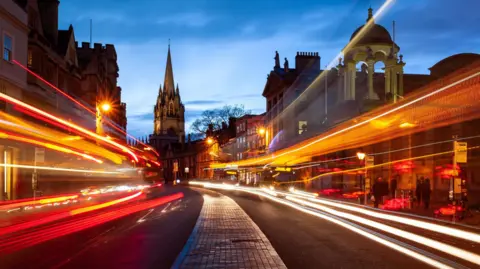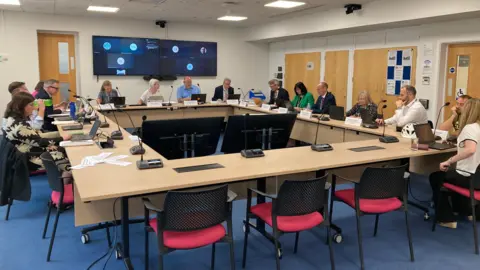Congestion charge plans to go to public consultation
 Getty Images
Getty ImagesPlans for a temporary £5 congestion charge for car drivers in Oxford will be the subject of a public consultation from the start of next week.
Oxfordshire County Council's cabinet has agreed to take the proposals forward to the next official stage and will launch a survey for the public to offer feedback.
Its meeting was attended by local business representatives, bus companies and cycling organisations, as well as councillors, speaking both in favour and against the proposals.
If adopted, the scheme is due to launch in the autumn and would last no longer than two years.
Andrew Gant, Oxfordshire County Council's transport chief, said he was "looking forward to hearing what residents, businesses and visitors have to say about the proposal".
"We must do all we can to improve bus services and reduce overall traffic, to help people get around," he added.

The temporary congestion charge plans are designed to reduce traffic on some of the busiest roads in Oxford, making bus journeys faster and improving safety for cyclists and walkers.
They use large parts of the council's delayed traffic filter programme, including the automatic number plate recognition technology and exact locations where the filter plans were to be introduced.
Instead of fining vehicles for passing through the area, as would be the case with the traffic filters, car drivers would instead need to pay a £5 congestion charge, irrespective of the direction they are travelling in.
This makes it different to other congestion charge areas, where an entire zone is inaccessible without paying the charge.
In Oxford, car drivers would be able to avoid the cameras by using different routes, with the exception of the very centre of Oxford - including the car parks at Westgate, Oxpens, Worcester Street and the station's long and short stay car parks.
The public consultation will be hosted on the county council's Let's Talk Oxfordshire engagement platform and will run for six weeks. A series of online information sessions are also planned by the council.
You can follow BBC Oxfordshire on Facebook, X (Twitter), or Instagram.
